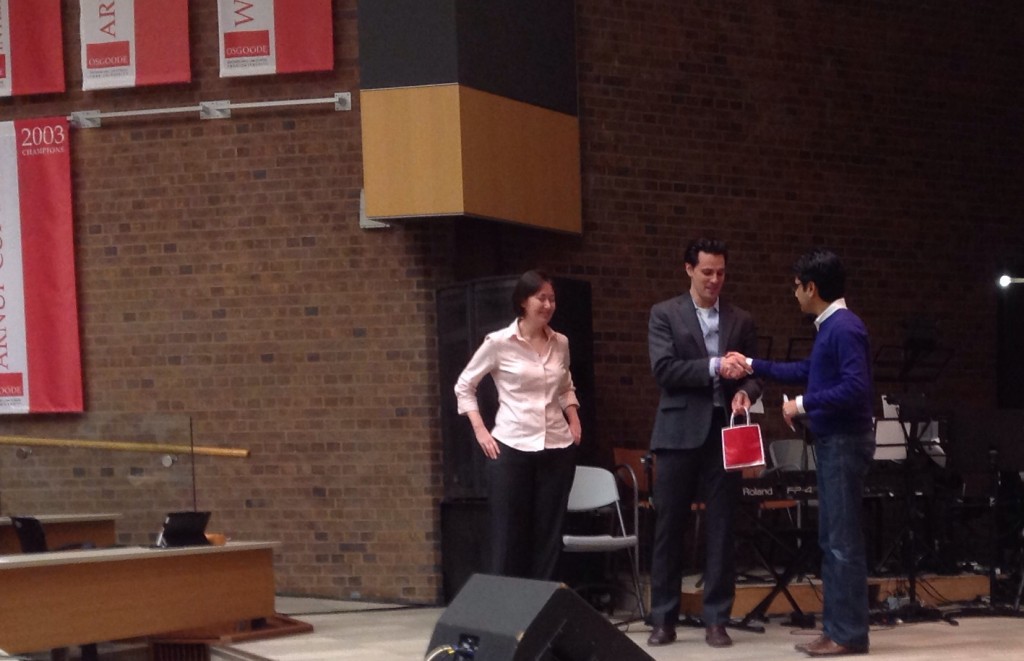Last February 11, Ontario’s Minister of Labour, the Honourable Yasir Naqvi attended Osgoode to give a special lecture on “Employment Law, Politics, and the Stronger Workplaces for a Stronger Economy Act”. As it turns out, the day before, the Obiter received an unexpected email with an invitation from the Minister’s Director of Communications to interview the Minister after the lecture. I accepted, of course. The perks of being Obiter Dicta’s News Editor!

Minister Naqvi completed an LLB at the Faculty of Law at the University of Ottawa. Although a proud alumnus of the said university, he began his lecture by confessing that Osgoode rejected his application three times. “I can tell you that you are far smarter than I am,” the Minister said without a hint of jealousy or regret. Indeed, after he finished law school, Ottawa became the Minister’s permanent home. He has now been representing the riding of Ottawa Centre for the past six years, and the lecture marked a one-year tenure as Minister.
Within the past year, the Ministry of Labour has implemented a number of policy changes, including the recent increase to the minimum wage. Someone once said that the first step toward change is awareness, and this is advice that the Minister seems to have taken seriously. Indeed, many of the new policies and initiatives have resulted from consultation with different stakeholders.
In regards to health and safety, the aim is to transform the approach from reactive to a more proactive and preventive one. Most of the accidents and fatalities that take place in the workplace are preventable. In order to change the approach then, different concerned groups are being included in the conversation about prevention. Accordingly, Ontario is the first Canadian province to have, as of July 2014, mandatory training for all workers and supervisors that aims at giving them a basic understanding of their rights (i.e. the right to refuse unsafe work, ask questions, etc.).
The next step is to take this program beyond the workplace and into classrooms (and other related places) so that when students get their first summer job, they are aware of their rights and are not exposed to unsafe workplace conditions. The toughest part of his job, the Minister said, is to read the emails he gets every time the Ministry’s investigators are dispatched to investigate workplace accidents. As the Minister put it, “when people go to work in the morning, we need to make sure that at the end of their shifts, they go home safe.”
The lecture did not go on without some tough questions and critical comments. In particular, it was noted that the changes taking place in regards to health and safety, do not include a focus on harassment or, in general, the respect of human rights. The issue, the Minister said, is the definition of health and safety; and although this definition is expanding, there has not been a lot of attention paid to mental health. The topic has been slowly incorporated to the basic training program. In addition, a report is soon coming out on Post-Traumatic Stress Disorder in the work place, specifically among first responders. There is not a lot of information on the impact and prevalence of the disorder in the workplace. So the report is expected to shed some light on the issue and lead to important changes.
Another two important changes include the increase in the minimum wage and Bill 146. Consistent with the theme of wide-range consultation, changes regarding the minimum wage came from the input of a multifarious panel composed of participants such as students and members of a poverty group, tourism and retail industries. An interesting aspect of the minimum wage reform is that it “take[s] the whole notion of determining minimum wage out of politicians’ hands” which, like the Minister put it, “is a very anti-politician thing to say.” Indeed, the recommendations of the panel include that the rate be revised every year and adjusted according to changes in the Consumer Price Index.
In terms of Bill 146, there are four big areas in which changes are being implemented. The Bill is a response to the recommendations made by the Law Commission of Ontario in respect to changes to the Employment Standards Act. One change concerns the issue of unpaid wages. Previously, a worker could only bring a claim to the Ministry for up to $10,000 within six months. This is now being changed so that there is no limit in the claim amount, and the limitation period is being increased to two years. This is in an effort to make recovery of wages easier and more economical for employees. Second, joint and several liability is being introduced among temporary help agencies and their clients for both unpaid wages and WSIB compensation. A third change is increased protection for foreign national workers under the temporary foreign workers program, especially when it comes to live-in caregivers. Finally, the last change concerns internships. Although internships and co-ops are included in the Employment Standards Act, they are not covered by the Ontario Health and Safety Act. This is because the definition of employee does not cover these individuals. Accordingly, the definition will be repealed and replaced.
When I asked the Minister what he thought of Quebec’s Charter of Values, he replied: “[This is a] document that is anti-Canadian…our country and our Charter of Rights and Freedoms are about respecting each other, being tolerant and inclusive, and respecting each other’s faith. I and our government oppose the Charter.”
Finally, for those law students who are thinking about a career in politics, getting involved in the community is key, says Minister Naqvi. Public service is “a rewarding experience” and “an amazing way of building one’s community.” The best part is that, as a law student, the individual is already equipped to cope with the challenges of public service: problem solving. Anyone interested in municipal politics?
